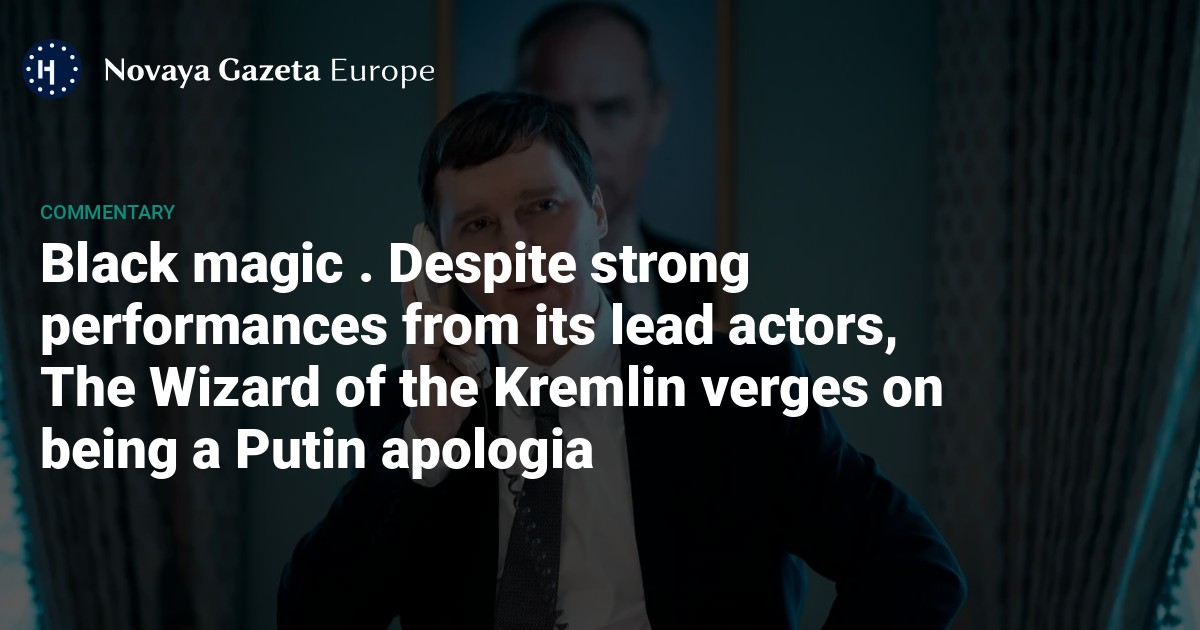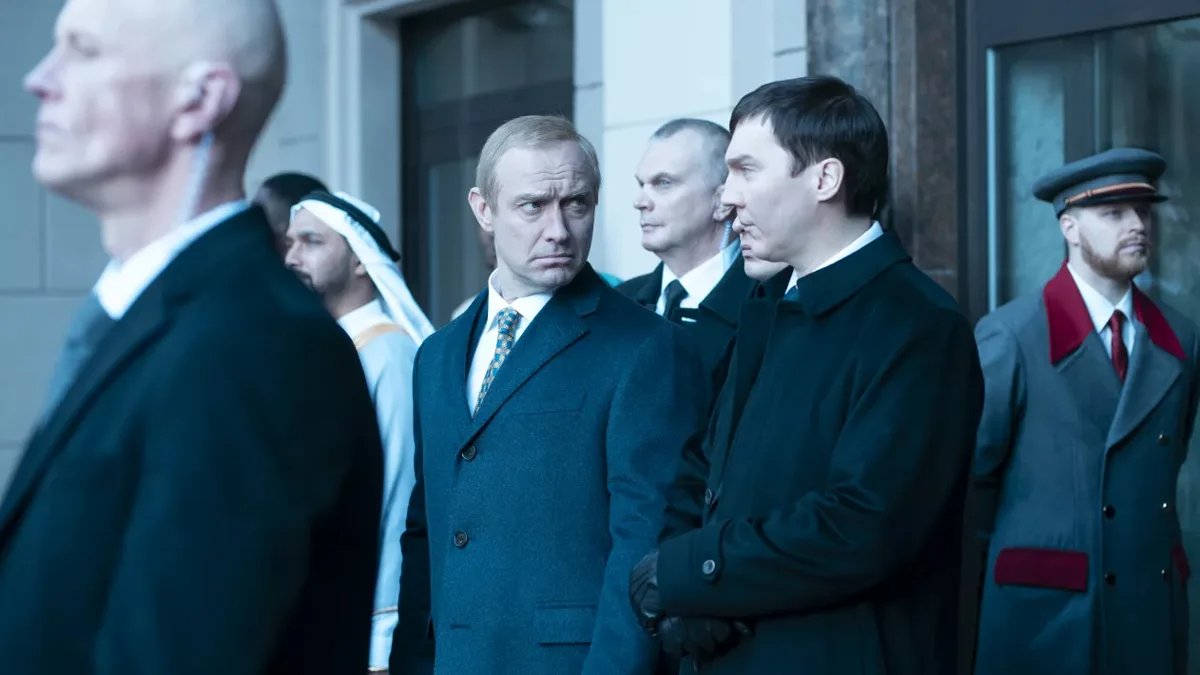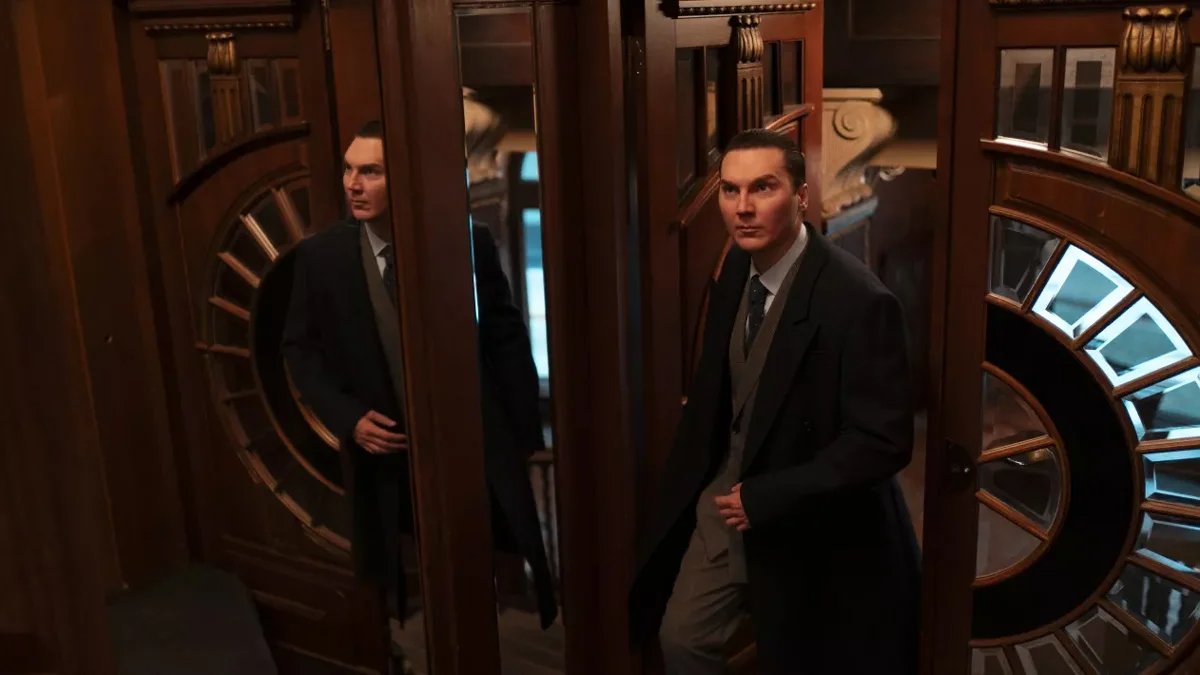



Though there wasn’t a single poster for Olivier Assayas’s new film The Wizard of the Kremlin on the Lido in the run up to its premiere on Sunday at the Venice Film Festival, it was, for Russian audiences, by far the most anticipated film in this year’s programme, addressing a key relationship that went on to shape much of contemporary Russia’s unenviable political landscape.
Based on the novel of the same name by Giuliano da Empoli, Assayas’s film casts Jude Law as Vladimir Putin and Paul Dano as embittered political strategist Vadim Baranov, a barely disguised version of Vladislav Surkov, who, as Putin’s deputy chief of staff during the first decade of his presidency, dominated Kremlin politics from behind the scenes before gradually falling from favour and eventually being expelled from the corridors of power in 2020.
The film spares no effort reminding us where it takes place — the ubiquitous snow crunches, the ubiquitous vodka flows, and no woman’s outfit is complete without a fur hat, however half-heartedly such touches are applied. Indeed, The Wizard of the Kremlin is a workplace drama with the aesthetics of a TV movie, where oligarchs, officials and FSB officers sip tea from expensive porcelain while casually deciding the fate of Mother Russia.
In the film’s first 20 minutes, which are an almost verbatim adaptation of the novel, we learn that it is the year 2019 and Baranov’s days in the Kremlin are over. Despite retiring from politics, however, he has for some reason invited a literary academic who happened to comment on one of his Twitter posts to visit his sumptuous estate outside Moscow. Played by an underused Jeffrey Wright, the academic, who also narrates the film, is fated to hear the story of Baranov’s rise and fall from the man himself.
Dano’s screen version of Baranov is a faithful copy of the novel’s protagonist scripted jointly by Assayas and French literary star Emmanuel Carrère, best-known to an international audience as the author of a celebrated piece of faction about the life of émigré Russian writer turned far-right extremist Edouard Limonov. Indeed, Carrère is given a cameo in the film playing a French teacher speaking patronisingly to Russian students in a smoke-filled kitchen during an early-1990s house party.
Baranov is a version of Surkov who has been stripped of all the intriguing biographical elements the erstwhile Kremlin insider never deigned to confirm, such as his Chechen family background and his abandoned studies at the Moscow Institute of Culture. Instead, he is portrayed as a descendant of both tsarist and Soviet nobility, in a manner that recalls the Oscar-winning director Nikita Mikhalkov, another ultra-Putinist star in Russia’s cultural firmament.

Jude Law as Vladimir Putin in a still from The Kremlin Wizard. Photo: Carole Bethuel / Curiosa Films / Gaumont
In his minimalist performance, Dano plays Baranov/Surkov as somebody quite devoid of emotion, substituting his chubby cheeks and ugly haircut for any real character, an opaque vessel whose true feelings can never be known. This is a man forced against his will into malevolence who claims that in different circumstances he would have befriended feminist punk band Pussy Riot instead of persecuting them.
Jude Law is very good as Putin, copying his crooked gait, sour facial expressions and other physical idiosyncrasies that bespeak his callousness and total lack of empathy. Somehow Law manages to immerse himself in the role of the Russian dictator without lending him a scintilla of his personal charm, for which he deserves great credit.
In one telling scene, Baranov says that Russia’s goal is not to conquer Ukraine, but rather to plunge it into chaos, and the methods employed by the ideologues of the so-called “Russian World” are very plausibly demonstrated in the film: the difference between a fake and a lie is that a lie knows exactly what the truth is, whereas a fake is born from a mixture of both. As Surkov himself clearly understood, disinformation creates chaos and erodes the boundary between truth and fiction, a mechanism that — whether intentionally or not — is consistently used in the film as well.

Still from The Kremlin Wizard, 2025. Photo: Carole Bethuel / Curiosa Films / Gaumont
Law and Dano both give bold portrayals, with Law’s Putin happy to embody the little man and willing to surround himself with thieves and murderers to stand up to the US at any price, while Baranov/Surkov spreads lies against his will and bribes both his supporters and opponents on the understanding that discord is an essential tool for any éminence grise — all in order to save Russia from the oligarchs, naturally. However, portraying both men as selfless ascetics in thrall to circumstance is outrageous for anybody aware of their graft and lavish lifestyles.
Despite their striking faithfulness to the source material, Assayas and Carrère do go a step farther by adding an out-of-the-blue event that transforms Baranov/Surkov into a tragic figure at the end of the film, placing a crown of thorns on his head, something that da Empoli was clearly not prepared to do.
At one point in the film, Dano’s titular wizard explains that hybrid warfare is combat fought not only on the battlefield, but also in news feeds, on social media and, ultimately, inside people’s heads. As such, there are no unwitting bystanders in such a war, only active combatants. The Wizard of the Kremlin appears to have been unwittingly drawn into this hybrid war itself, and for some reason opted to take the side of the villain.
The Russian government has banned independent media. We were forced to leave our country in order to keep doing our job, telling our readers about what is going on Russia, Ukraine and Europe.
We will continue fighting against warfare and dictatorship. We believe that freedom of speech is the most efficient antidote against tyranny. Support us financially to help us fight for peace and freedom.
By clicking the Support button, you agree to the processing of your personal data.
To cancel a regular donation, please write to [email protected]
VPNovaya
Help Russians and Belarusians Access the Truth
